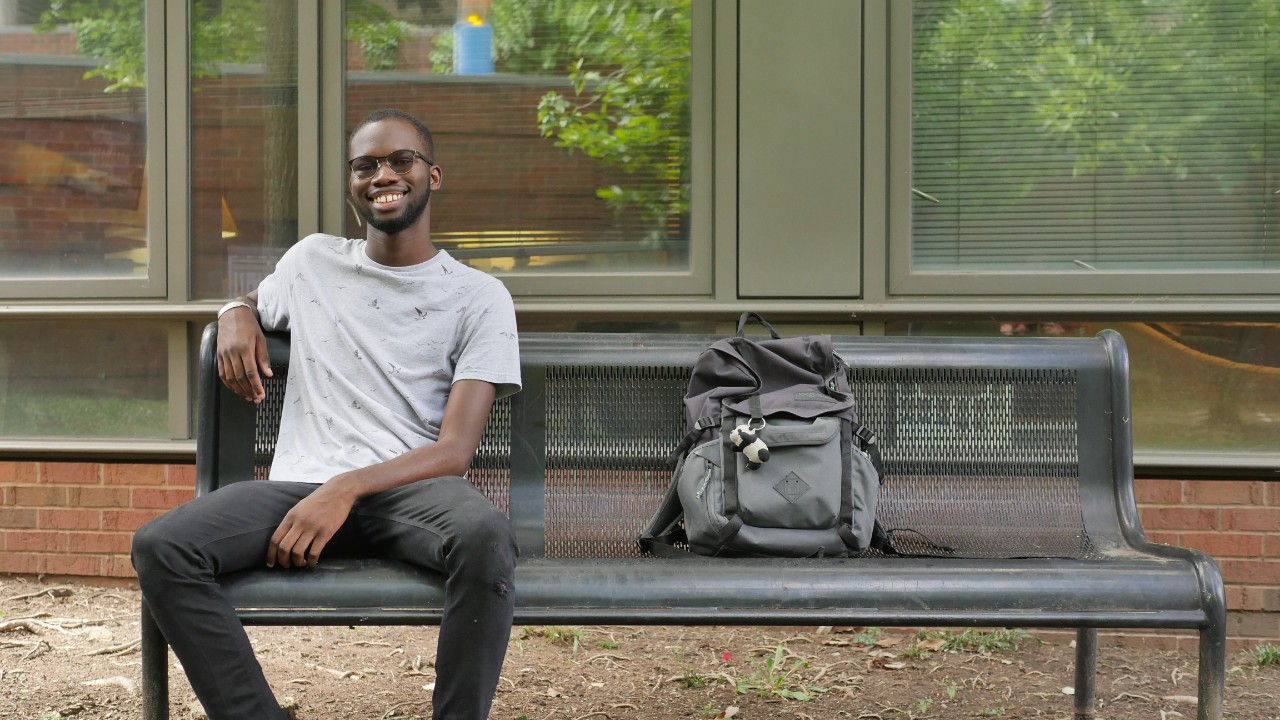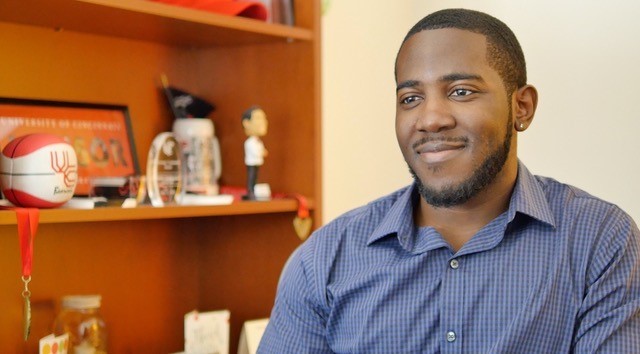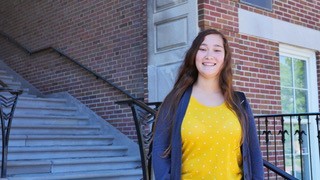
Advising students toward success
The modern academic advisor does much more than schedule classes. Learn what they do and how they impact student success at UC.
2003: It was the year Michael Jordan retired from basketball, the year the space shuttle Columbia tragically disintegrated reentering the earth’s atmosphere and the year Apple launched iTunes.
It was also the year 33,823 students were enrolled at UC with only a handful of academic advisors to help them.
In stark contrast, there are 46,388 Bearcats today, and 130 advisors to support and guide their academic and personal experience.
“Advisors help bridge care with academic excellence,” says Caroline Miller, vice provost for enrollment management.
Miller, who joined UC in 2004, says advising, along with academic instruction, are UC students’ highest priorities — and the growth of advising has been cultivated by a well-thought out and purposeful strategy.
“We have carefully built an advising structure over the course of the last 16 years that is personalized and increasingly proactive,” adds Tara Warden, assistant vice provost for enrollment management and advising, who has worked hand-in-hand with Miller and other advising leaders since she joined UC in 2003.
Now, they are leading a team to build a new framework that is both tech and human supported as part of UC’s strategic direction, Next Lives Here. “Bearcat Promise,” as it’s titled, is an innovative student success approach that supports students throughout their entire academic journey.
Building a Success Framework
Student graduation and retention are two major challenges institutions within higher education have been grappling with for decades. According to a 2019 report by Tyton Partners, the largest study on student success to date, only 59 percent of full-time students that start college will graduate within six years, and retention of first-year students hasn’t improved within the last 10 years. Those numbers are even more troubling for first-generation college students and students of color.
UC, however, is bucking national enrollment and retention trends, and there is a direct correlation to its student advising model.
We had a big hole to fill when you go back 15 years. That first year our retention was 72 percent and now it is 88.3 percent. The baccalaureate graduation rate was 48 percent and now it is 71.6 percent.
Caroline Miller, Vice Provost for Enrollment Management
Miller and Warden say mandatory first-year advising is a big reason for increasing student success rates.
According to the most-recent Student Satisfaction Inventory conducted by UC’s Office of Institutional Research, UC students say advising is the most important service provided by the university, and they say the quality of advising has improved over time, too.
Student satisfaction rates have increased nearly 10 percent between 2008 and 2019 — an increase that can be tied directly to student success rates.
Susanna Luzuriaga, director of UC’s Office of Institutional Research, says UC students are reporting they are quite satisfied with the services they are receiving. “The distribution of data, when compared to other universities, is significant and serves as a confirmation that UC’s advising model is working.”

Derek Cunningham is an advisor for UC's Center for Exploratory Studies.
“Students can be frazzled and stressed,” says Derek Cunningham, an advisor for UC’s Center for Exploratory Studies in the McMicken College of Arts & Sciences. “Advisors are the constant resource for them while they adapt to the change of college and the changes throughout their time at UC.”
Derek is no stranger to UC. He graduated with a degree from UC’s accounting program in 2014. While working in the accounting field, he earned an online graduate degree in advising from Kansas State and landed a position as a UC advisor in 2017.
"Now I get to help students find their path and help them figure out what is going to make them happy.” adds Derek. “I am living proof that plans change, and if plan A doesn’t work out, you can always develop a plan B to get you to a career you want.”
Derek actually began his first year at UC as an engineering major but struggled with calculus, so he switched his major to accounting.
A sign hangs in his office that reads: ‘If the plan doesn’t work, change the plan but never the goal.’
Derek says, “Advisors get labeled as ‘task masters’, but we do more than schedule classes. Advising is really teaching. We help students create a picture of their future and then utilize different resources, assessments and tools to get them where they want to be.”

Rachel Hillard, a third-year student from Columbus.
Rachel Hiller is a third-year student from Columbus who came to UC without really knowing what she wanted to major in.
“The first time I met Derek was at orientation,” says Hiller. “I could immediately tell he was a cool person. He is genuinely kind and really cares about his students.”
Hillard says Derek taught a class called Discover UC that introduced her to majors she never knew existed.
“Working with Derek made me feel more confident in my choices. He was supportive, helped me reach out to people and connected me with resources. I could tell he was invested in me as a person,” she adds.
The support and guidance Derek provided Rachel helped her identify a major and career path, an outcome that is supported by research. According to an article published in the National Academic Advising Association’s (NACADA) Academic Advising Today, successful academic advisors strive for meaningful interactions with their students and identify pathways for both academic and social success.
That’s exactly what Abou Thiam says his advisor at UC Blue Ash, Melissa Al-Rdani, helped him do. Abou, who goes by “Leo,” is a refugee from West Africa. His mom brought him to the U.S., he says, for a better life and schooling.
“Melissa would listen to me, because I always had advice from friends, but she would then tell me what she really thought,” says Leo. “She helped me find clubs and helped me find classes that were the best fit for me and still met requirements.”
Leo says he struggled academically, but Melissa provided some redirection and support. Enough, in fact, that he brought his grades up and transferred to UC’s Uptown campus for the 2019-2020 academic year.
“I think advisors almost serve as a second parent,” he adds. “They are there to give you advice and keep you on track.”
Narrowing the Technology Gap
Creating and maintaining a personal connection with students can be challenging for UC advisors. On average, advisors at UC support about 369 students each. That’s why technology — to efficiently access resources and tools — is critical.
“Advisors are viewed as the crossroads for student success because their work spans academic life, personal life and enrollment throughout a student’s entire college experience. The technology platforms have expanded to facilitate better connection and clarity for students. But our next work is to better integrate and utilize the data — to make the work more manageable and information about the students more actionable,” says Warden.
In a given day, a UC advisor utilizes up to 15 different systems or data sources.
“Technology is important because it helps us understand where students are, what they need, and what they need from me,” says Melissa Al-Rdani, an advisor at UC Blue Ash who supported Leo prior to his transfer to UC’s Uptown campus. “I use Catalyst, Starfish…My Graduation Plan to help them plan out their degree, Degree Audit to see what they’ve done and what they still need, and even admissions tools like Slate.”
A key focus of Bearcat Promise is looking at how tech solutions can best support academic advising and ultimately student success.
Tara Warden, Assistant Vice Provost for Enrollment Management
Warden says most institutions utilize a variety of different technologies to support student success, but what UC is doing with Bearcat Promise is unique. “We are creating a digital interface to bring resources together for students so we can all work smarter and more efficiently to establish a digital student success platform.”
She says advising and student success is really a tag-team approach with student support services and faculty throughout the university. At UC, advisors partner with Student Affairs, Experiential Learning and Career Education, and college-specific supports to establish academic, social and experiential pathways to optimize student success.
Leading Within Higher Ed
The work of UC’s Academic Advising Team, and the university, has not gone unnoticed. The team has been invited to speak at conferences and institutions throughout the country. And in October, Warden will represent UC to receive the 2019 Michael C. Holen Pacesetter Award at the NACADA Annual Conference. The award, given to senior leaders whose work demonstrates a commitment to advancing the advising profession, is one of the “Big 4” global awards presented by NACADA each year. However, what may be most impressive about receiving the prestigious award, is that the nomination was initiated by front-line advisors and advising administrators at UC.
Miller and Warden both say the institutional awareness of how critical advisors are to student success has been instrumental in positive outcomes. UC’s Advising Strategic Plan was unanimously supported by Faculty Senate – a rare accomplishment even for the few universities who have deployed a strategic plan for advising.
And now, faculty, the Career Education team, and the Bearcat Promise team are working together to embed career education outcomes into the curriculum of every program offered at UC to ensure students graduate with a diploma in one hand and a career plan in the other.
“It’s an approach,” Miller says, “that allows students to gain personal, professional, and social growth while increasing their sense of belonging and engagement with campus supports.”
Featured image at top: UC student Leo Thiam. Photo/Josh Wientge/Co-op 2.0 Intern, Office of the Provost.
Related Stories
UC celebrates record spring class of 2025
May 2, 2025
UC recognized a record spring class of 2025 at commencement at Fifth Third Arena.
‘Doing Good Together’ course gains recognition
May 1, 2025
New honors course, titled “Doing Good Together,” teaches students about philanthropy with a class project that distributes real funds to UC-affiliated nonprofits. Course sparked UC’s membership in national consortium, Philanthropy Lab.
University of Cincinnati community unites for UC Day of Giving
April 30, 2025
The University of Cincinnati's annual Day of Giving, that ran from noon to noon on April 8-9, successfully raised more than $1 million to support scholarships, foster innovation, and sustain the UC community.
